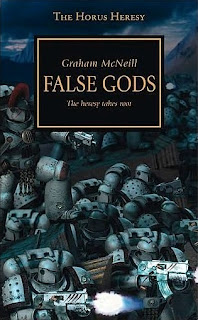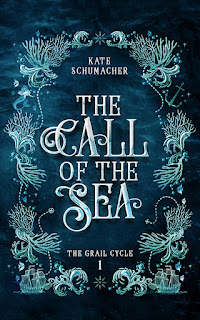Hello and welcome to our latest author interview with Graham McNeill, fantasy/sci-fi author and video game writer!Please tell us a little bit about yourself and your writing.
My name’s Graham McNeill, and I’ve been a published writer for just over twenty years now. I started out writing adventures for our games of D&D that rapidly expanded in scope to encompass large-scale battles with the fate of the world at stake, etc. and RPG rules aren’t really set up to handle mass-battles, so I turned to Warhammer, then in its Third Edition. I really got into the tabletop wargaming side of things, to the extent that it kind of took over. I wrote fiction for each of the armies I collected, as well as stories that added a narrative element to our battles; who was fighting and why, what the outcome meant for the ongoing campaign and suchlike. That led me to doing actual stories and eventually a novel, which, for all it’s many flaws, has a lot of the seeds, themes, and archetypes that still permeate my fiction.
I was fortunate enough to land a job at Games Workshop, back in the year 2000 and worked there for the next six and a half years, first as a staff writer, doing background articles, hobby reports, etc., until I did some work for Gav Thorpe’s new game, Inquisitor. And from then on, I was working on Codexes for Warhammer 40k, Army Books for Warhammer, and Supplement Books for Lord of the Rings strategy battle game. While I was at Games Workshop, I’d done a few short stories for Black Library’s story magazine, Inferno! and they’d gone down well, so they asked me if I’d like to write some novels for them, which was a no-brainer for me. So, along with my day job in the Design Studio, I wrote a slew of novels for Black Library, starting with Nightbringer in 2002. More followed until I left Workshop late in 2006 and plunged into the choppy waters of freelance writing, which was often stressful, but always great fun.
Over the next ten years, I continued to write more novels, short stories, comics, etc. until eventually I left the UK to join Riot Games in the US, where I’ve been happily ensconced in Los Angeles for the last eight years.
Your favourite thing you've written or published?
That’s an impossible question to answer. Over the years, I’ve written around forty novels and over a hundred short stories, so picking a favourite is like picking a favourite child. Having said that…the story I’ve just written always seems to be my favourite, at least until the next one. But in an attempt to give you a proper answer, I think you start every story with a ton of things you want to accomplish with it, beats you want to hit, themes you want to explore, character moments you want to see realised as you imagined them in your head. Most often, you get some of that, but it’s rare you ever hit all the marks you aimed at when you set out on the journey of the novel. But of all the books I’ve written, the one I feel I managed to hit the most of those marks was probably, A Thousand Sons, though Heldenhammer, the first book of the Sigmar trilogy was where I got to unleash my inner Robert E. Howard, and Nightbringer will always have a special place in my heart, as it was my debut novel. I don’t often go back to reread my stuff, beyond fact-checking, and reestablishing a tone if I’m doing a sequel, but the only novel I’ve written I’ve ever gone back to and read again, cover to cover, was The Ambassador Chronicles. As for short stories, The Last Church has probably been the one I was most proud of in how it challenged me, the readers, and Black Library, as it’s basically two guys talking, without any shooting or getting into combat – in an IP where those things are pretty much de rigueur. So, yeah, you see, it’s a hard question to answer, because there’s already a bunch of other stories crowding into my head, saying, ‘What about me!?’
Who would you say your biggest literary influences are?
Well, it would be remiss of me not to mention Tolkien, as he stands so tall over the fantasy genre, and I certainly remember loving The Hobbit and The Lord of the Rings as a young reader, but the first fantasy book I remember reading was Alan Garner’s The Weirdstone of Brisingamen. All of those books, together with the works of Robert E. Howard, Raymond E. Feist, Lovecraft, Terry Pratchett, Douglas Hill, and David Eddings, et al cemented my love of fantasy, but as to the biggest influences on my writing, I’d have to say that David Gemmell and Clive Barker have exerted the greatest narrative centre of gravity. I love Gemmell’s earthy heroes and the grit he brought to the genre, and Clive Barker’s ability to craft beauty from the grotesque really appealed to me.
Do you feel like your writing has been impacted/influenced by Tolkien? If so, in what way(s)?
I think all of us who write in the fantasy space have to say we’ve been influenced to a degree by Tolkien’s writing, either seeking to emulate it, be inspired by it, or to actively subvert it. Like it or not, so many of the fantasy tropes we take for granted come from his work, and I like to see myself as a tiny part of the continuum that stretches out from his work. Given a lot of my work has been for Warhammer, it’s impossible not to have felt his influence and work in a genre and IP that takes a lot of its inspiration from the worlds of Middle Earth. Though Warhammer has its own quirky, dark, 80s vibe, the threads of Tolkien’s work are evident in the warp and weft of its fabric. The thing I take most from the works of Tolkien is the world-building, the way he was able to make a fantastical land feel real and lived in, with its own history and culture that felt worn in and believable. I’m a big believer in making my worlds feel like, no matter the fantasy trappings of magic, dragons, etc., they feel authentic beyond that first impossible thing, that all other things naturally flow from the notion that such things are real in this world.
How has the history of the middle ages impacted/influenced your work?
Building off the last point, I try to make my works feel as believable as possible and I love to incorporate real aspects of history and ancient warfare to make them feel authentic (though in many cases, real history is far more outlandish than fiction!). I feel that if you can ground your world and characters in something that feels real and tactile – without choking the reader with your research – it makes the fantastical elements really sing and gives an air of realism to events and narratives that might otherwise feel over the top. There’s too many to mention, but I want to single out the work of writers like Michael Livingstone and Kelly DeVries (Medieval Warfare, Never Greater Slaughter) whose books have been tremendously useful, alongside James Romm (Ghost on the Throne), Christopher Duffy (Fire and Stone), and E. Viollet Le-Duc (Annals of a Fortress), all of whom have greatly illuminated me on ancient histories and the science of fortress warfare.
What do you think the current innovations in your genre(s) are?
I’m not sure about current innovations, but one thing fantastical fiction is exceptionally good at is holding up a mirror to the world and using genre stories to offer critiques on modern society by taking contemporary trends and taking to their wildest extremes as cautionary tales. SF tales in particular (but also fantasy, more and more) are great vehicles for addressing a current situation by stealth as it were, and showing what might happen tomorrow if we don’t take action today. And, though I don’t think it should count as an innovation (and has been far too long in coming) the fact that we’re seeing new voices and new stories emerge from an increasingly diverse pool of writers, is only to the benefit of the genre and readers as a whole.
What is something in your genre(s) you'd like to see more of?
Stories that break new ground, either in the kinds of characters we see represented or doing something new with the types of plots and structures we often get retold to death. Stories that subvert traditional narratives and challenge a reader to hold on as the writer trusts them to handle ambiguity and/or make leaps of faith and know that all will be well by the end.
What is something in your genre(s) you'd like to see less of?
I’m a big believer in trusting that the reader is clever and doesn’t need the handholding some stories believe they do. If you give the reader enough of the story that they can fill in the blanks, then you don’t need to spoon-feed them the plot and have the, “As you know, Susan…” exposition conversation. Which isn’t to say you shouldn’t have all the things in there you need or miss things out deliberately, just to be intentionally vague, but if you’ve done your job right, the reader can figure it out and feel like they’ve been part of the story as well, that you’re not talking down to them and explaining things they’ve already figured out.
What are your favourite themes to work with or write?
I love a good underdog story, so a mission against impossible odds is always a favourite, as is the story being told at an inflexion point where a small number of plucky heroes can make a difference. One of the features of Warhammer writing, especially in its 40k setting, is the grimdarkness of it all, where there are no heroes and (almost) no happy endings. To me, that can get a bit bleak and nihilistic, so, much like in Pandora’s Box, I think there always needs to be a sliver of light against the darkness to make the struggles of the characters feel worthwhile. I mean, if there’s nothing to strive for, then what’s the point? I want my readers to empathise with the characters and their plight, but if you know they’re 100% doomed from the outset, then I feel a reader creates a kind of distance from them, which is the last thing I want. An emotional connection to the characters and their plight is key to hooking a reader, and making them feel something – for good or ill – is what makes a good story great.
Is there anything else related I didn't ask a question about that you'd like to add?
Hmmm...not sure. I suspect the only thing I’d like to add is a thank you to all the readers who’ve come with me this far, and a genial hello to those that might like to begin with one of my books. So, if you like gothic space adventure, then I’d heartily recommend my Forges of Mars trilogy, that starts with Priests of Mars. But if fantasy is more your thing, then you can’t go wrong with the Sigmar trilogy, which starts with Heldenhammer.
Where online can our readers find you and your work?
Most of my work is available at https://www.blacklibrary.com/ and you can see me and my work at www.graham-mcneill.com which has a Contact page, where you can drop me a line if you feel so inclined. And, for now at least, I’m on Twitter at @GrahamMcNeill
Graham, thank you so much for the interview and sharing your thoughtful answers with us!


























